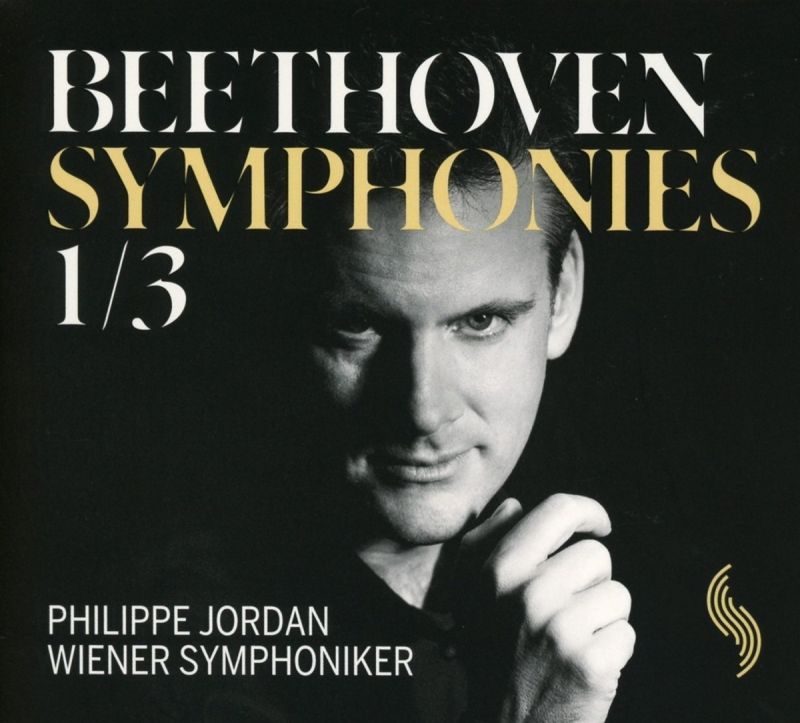BEETHOVEN Symphonies Nos 1 & 3 (Jordan)
View record and artist detailsRecord and Artist Details
Composer or Director: Ludwig van Beethoven
Genre:
Orchestral
Label: Sony Classical
Magazine Review Date: 01/2018
Media Format: CD or Download
Media Runtime: 72
Mastering:
DDD
Catalogue Number: WS013

Tracks:
| Composition | Artist Credit |
|---|---|
| Symphony No. 1 |
Ludwig van Beethoven, Composer
Ludwig van Beethoven, Composer Philippe Jordan, Conductor Vienna Symphony Orchestra |
| Symphony No. 3, 'Eroica' |
Ludwig van Beethoven, Composer
Ludwig van Beethoven, Composer Philippe Jordan, Conductor Vienna Symphony Orchestra |
Author: Richard Osborne
A little over a year has passed since a filmed cycle directed by Jordan was released on DVD (Arthaus Musik, 12/16). That was an essentially local phenomenon, the musicians of the Paris Opéra, of which Jordan is music director, being taken from their usual comfort zone to touch base with a French Beethoven tradition that goes back to the 1830s. By contrast, this new Vienna cycle is clearly the one with which 43-year-old Jordan intends to make his case.
In the notes to both sets, Jordan pays lip service to the preoccupations of our age: slimmed-down orchestras, fast metronomes, controlled vibrato, pointed articulation. In reality, such criteria date back, not to the 1970s, but to the Beethoven-conducting of Toscanini and Erich Kleiber in the 1920s. And it is to that larger, less doctrinaire tradition than Jordan himself clearly belongs.
You hear this in the first movement of the Eroica, which is tauter here than in Paris, less given to mannerism. The pace is a touch brisker than that we remember from recordings by Toscanini, Szell, Karajan, Bruno Walter and others (mm=54 as opposed to mm=52). Yet nowhere does it begin to approach Beethoven’s mm=60 (added retrospectively in 1817) which has been so fetishised of late, resulting in performances that are too quick for the music to be heard.
Jordan has dubbed the Eroica the first great ‘finale’ symphony; and so it is if, like him, you know where the great staging posts are movement by movement. The finale is certainly brilliantly done, even though, as in Paris, the first and second violins appear not to be antiphonally divided. Once again, the Funeral March is superbly presented: forward-moving in the French manner, with keenly felt climaxes.
These Vienna performances are generally a touch swifter than their Paris counterparts, with the first movement of the First Symphony notably brisker and more purposeful, a necessary amendment. At first I thought the finale a touch too quick but the performance is never gabbled or out of kilter, merely vivid. The serenading slow movement again goes with an enlivening swing, for all that it is a touch light on the cantabile which Beethoven also prescribes.
The recordings, which the sleeve claims are live, were made in Vienna’s Musikverein. They provide a cleaner, drier, more up-front sound than that on Rattle’s problematically live 2001 Vienna Philharmonic set (EMI, 4/03). The discreet halo of reverberation recalls the sound DG’s engineers drew from Berlin’s Jesus-Christus-Kirche for the celebrated 1961 62 Karajan cycle.
In sum, here are old skills married to new inspiration. At this late hour in the history of Beethoven on record, it would be unreasonable to ask for more.
Discover the world's largest classical music catalogue with Presto Music.

Gramophone Digital Club
- Digital Edition
- Digital Archive
- Reviews Database
- Full website access
From £8.75 / month
Subscribe
Gramophone Full Club
- Print Edition
- Digital Edition
- Digital Archive
- Reviews Database
- Full website access
From £11.00 / month
Subscribe
If you are a library, university or other organisation that would be interested in an institutional subscription to Gramophone please click here for further information.




